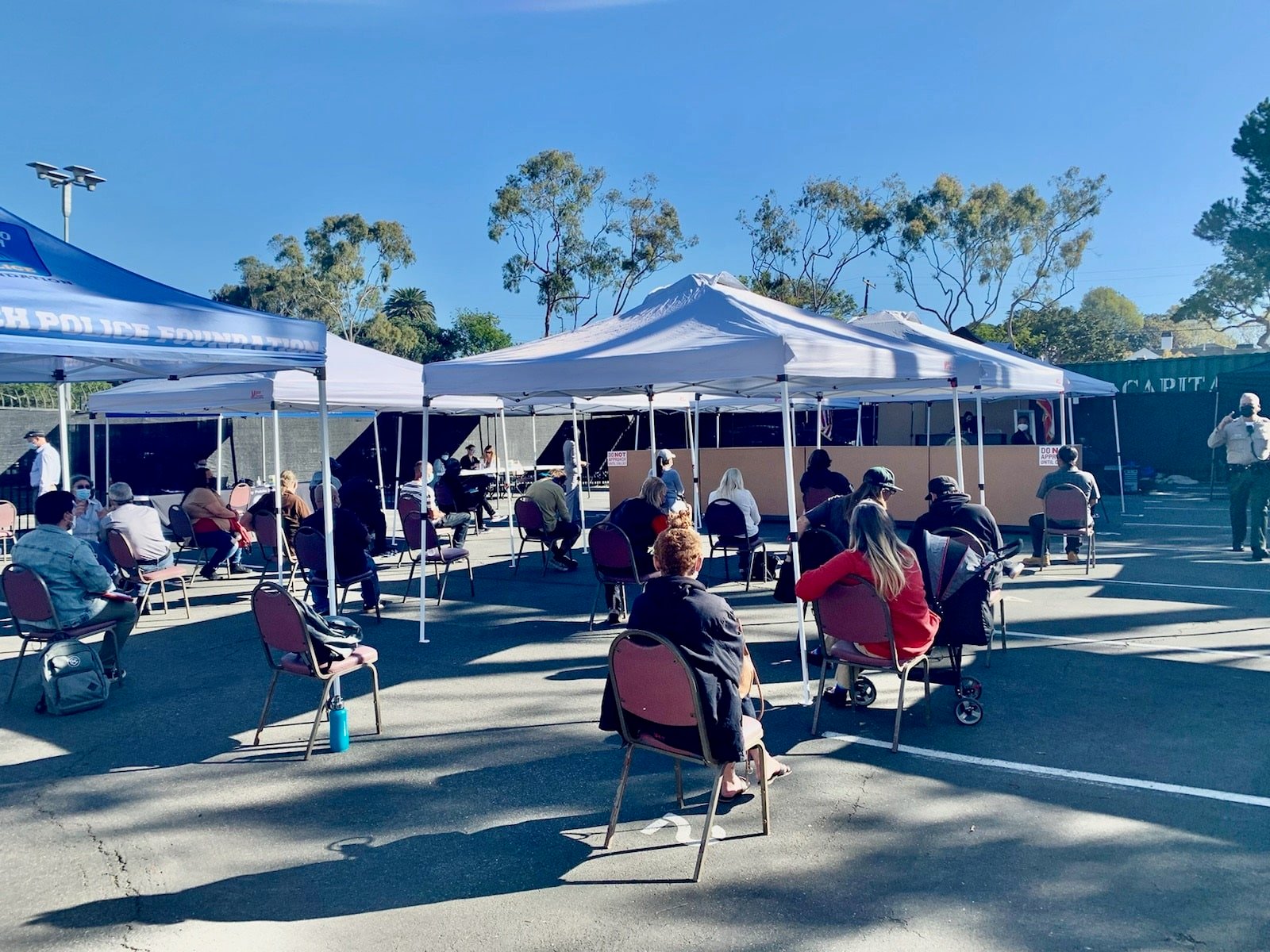(CN) — It’s common for people at the homeless court to break into applause.
Some judges might frown on a disruption in their courtroom, but this isn't like most courts. For one, it's held outside, in a parking lot, across from the Redondo Beach Police Department.
Another reason it's different? Everyone involved — the unhoused person, public defender, prosecutor and the community — wants the same thing.
“We all want to see the person permanently housed,” said Michael Webb, city attorney for Redondo Beach.
The homeless court’s location was born out of necessity due to the Covid-19 pandemic. The City Council in 2019 turned to Webb’s office for an enhanced response to the homelessness issue. Then the pandemic hit, and Webb offered the idea of holding the court outside.
“It’s a less threatening environment,” Webb said. “It brings the justice system to the community.”
It also changed how the city offers services to the unhoused. Under the old model, a judge would tell a defendant they needed to meet with a housing navigator and give an update at their next hearing the following month. Then, for example, the person would return, say they couldn’t reach the housing navigator and afterward lost their phone, Webb said.
Now, a housing navigator is present, as are other services like mental health care, addiction care and the public defender handling the case. In many cases, the first thing people need is an ID, enabling them to access government assistance. The homeless court has an arrangement with the local Department of Motor Vehicles' office. Defendants are given a document that enables them to go to the front of the line.
“In the past, that would take months,” Webb said.
People get into homeless court after getting charged with a crime, whether arrested or cited. Those who are unhoused facing nonviolent offenses get a choice at arraignment to transfer to the homeless court.
Typical offenses include those related to drugs, petty theft, being drunk in public and trespassing, Webb said.
On average, 79% of homeless court defendants make their court appearances — a high rate, Webb said. Fifty-seven percent were placed in temporary or permanent housing.
According to Webb, Redondo Beach had 176 unhoused people in 2020. That dropped to 99 in 2022.
Redondo Beach’s homeless court is a model Assemblyman Al Muratsuchi wants to see statewide.
Muratsuchi, a Democrat whose district includes Redondo Beach, is the author of Assembly Bill 67 — known as the Homeless Courts Pilot Program. If passed, it would create a grant program to provide funding for cities and counties that want to create their own homeless courts. That funding is subject to state appropriations.
“It doesn’t have a specific price tag,” Muratsuchi said.
The California Judicial Council would administer the pilot program and award the grants on a competitive basis. Cities and counties seeking them would need to show they can address the needs of the unhoused facing the criminal justice system, according to a bill analysis.
It would remain in effect until Jan. 1, 2029.
Unhoused people using the program would agree to a pre-plea diversion in their case. Their infraction or misdemeanor charges would be dismissed when they successfully complete the program.
Those who face violent felony accusations, serious felony accusations or an offense that requires sex offender registration could not participate.
The programs would have to meet certain requirements, including diversion. Other requirements include a public defender participating throughout the program’s duration, defendants attending regular court hearings, and temporary, time-limited or permanent housing for defendants.
The bill passed the state General Assembly in late May. It’s currently before the state Senate Appropriations Committee.
According to Muratsuchi, there are over 450 collaborative courts in the state. They include drug and veterans courts, as well as homeless courts. However, the latter are limited in number.
“These homeless courts, they provide wrap-around services like mental health treatment,” Muratsuchi said.
“Just a wrap-around approach to use the criminal court and not punish people for poverty,” he added.
Ricardo García, Los Angeles County public defender, agrees.
“In that court, nobody goes to jail,” García said of the Redondo Beach homeless court.
García called the program “exceptional,” doing more good on a large scale than its creators could have imagined. One reason: it brings the legal system to people who have the hardest time engaging with the courts.
“It creates an environment where care is the primary concern,” García said. “It’s not about punishing people, but really about helping them improve their lives.”
García said he’s impressed and pleased with Muratsuchi’s homeless court pilot program bill. He wants to help push the legislation through, as he’s seen the success of such courts.
“What Redondo Beach did was set the tone and show that this can be done,” García said. “These courts are proven models. They work.”
Webb praised Los Angeles County Superior Court Judge Alan Honeycutt, supervising judge of the Southwest Judicial District, in the Redondo Beach program’s creation. Honeycutt could have rejected the idea when first proposed, but instead became essential in making it happen, Webb said.
“People get off the street and they can get out of survival mode,” Webb said. “It is working.”
Subscribe to Closing Arguments
Sign up for new weekly newsletter Closing Arguments to get the latest about ongoing trials, major litigation and hot cases and rulings in courthouses around the U.S. and the world.









